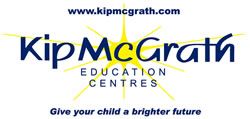KIP MCGRATH - SOME MORE QUESTIONS AND ANSWERS ABOUT EDUCATION
I have two children; one is starting Year 6 in September and will be doing the Transfer Test next year; the other will be starting Year 5.
Q. Should I get my child tutored for the Transfer Tests?
A. Tutoring, or extra help out of school, should not be just for exams but should be for the purpose of giving the child extra time to work on areas of the curriculum in which they are experiencing difficulties. There is little more demoralising to a child in school than feeling that they are the only one who ‘does not get it’. Due to the amount of work which needs to be covered in the curriculum, teachers are under a lot of pressure to move on to the next topic before some children have fully grasped the last one. Extra help out of school can make an amazing difference to these children by giving them the time they need to understand and practise the areas of difficulty. Parents should take note of any problem areas in maths, English and science and either help the child with these or, if this is not feasible, get them some extra help after school or in the holidays. It may simply be that the child has not had enough time to practise a topic in order to fully understand it, before the class has moved on and they have got left behind. If you feel that your child is experiencing difficulties with certain subjects or topics, make sure that you give them the help they need sooner rather than later in order that they have the time to become fully competent and therefore confident with the topic.
Q. How will I know if my child is having any problems with their school work?
A. Some children become demoralised and lose interest in school if they find they cannot keep up with their peers. Unusually sloppy homework, homework which the child has difficulty completing or a reluctance to go to school should all be investigated. A change of attitude in class, for example becoming disruptive, unusually talkative with their classmates, or day-dreaming, may be commented on by the teacher either at a parent/teacher interview or in a note sent home. These can all be indicators that a child is not happy or is struggling with the level of work in class.
Q. Where can I find out more about the Transfer Tests?
A. The CCEA website has further information with more ‘Frequently Asked Questions’ and answers.
Q. What about my younger child who will not sit the Transfer Test because it has been abolished?
A. Information available on the Northern Ireland Curriculum website suggests that Diagnostic Assessment will be introduced in Year 5 from September 2007, as part of the Pupil Profile, to identify a pupil’s strengths and areas for improvement.
Q. What does the diagnostic assessment involve?
A. Schools will use InCAS (Interactive Computerised Assessment System) which consists of 11 modules. The first 3 modules are word recognition, word decoding and comprehension, and these produce the pupils reading age. The remaining 8 modules are spelling, general maths (which generates a general maths age), mental arithmetic, non-verbal ability, picture vocabulary, attitude to maths, attitude to reading and finally, attitude to school.
Q. What will my child have to do?
A. Children will be asked a selection of initial questions based on their age and then further questions which are selected in response to their answers.
Q. What is the Pupil Profile?
A. Information available on the Northern Ireland Curriculum Website suggests that this will replace the traditional annual report. It will involve teachers assessing and reporting each pupil’s progress and achievements and will be used to provide information for parents about how they can assist with their child’s learning at home, for teachers, to help them plan learning and teach, and for pupils, about their achievements and how they can improve.
Q. Will this be used at the end of Primary School as there will be no Transfer Test?
A. A Pupil Profile Summary will bring together all the information gathered during the child’s time at primary school. This will be given, in the autumn
County Down




